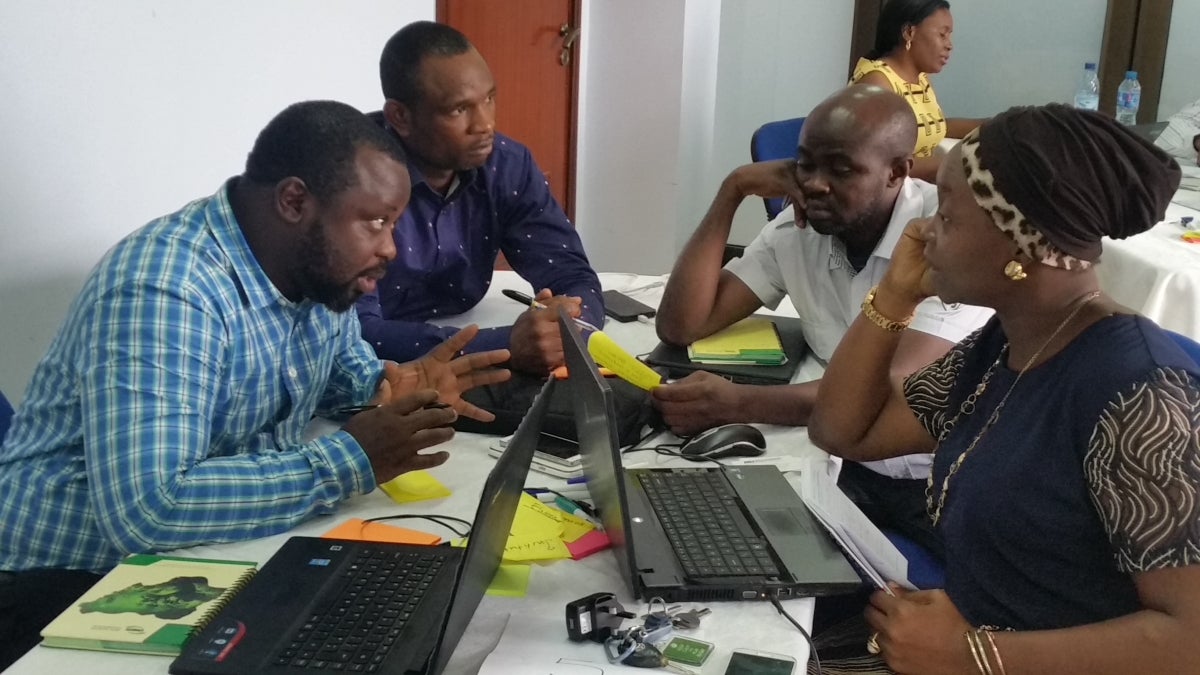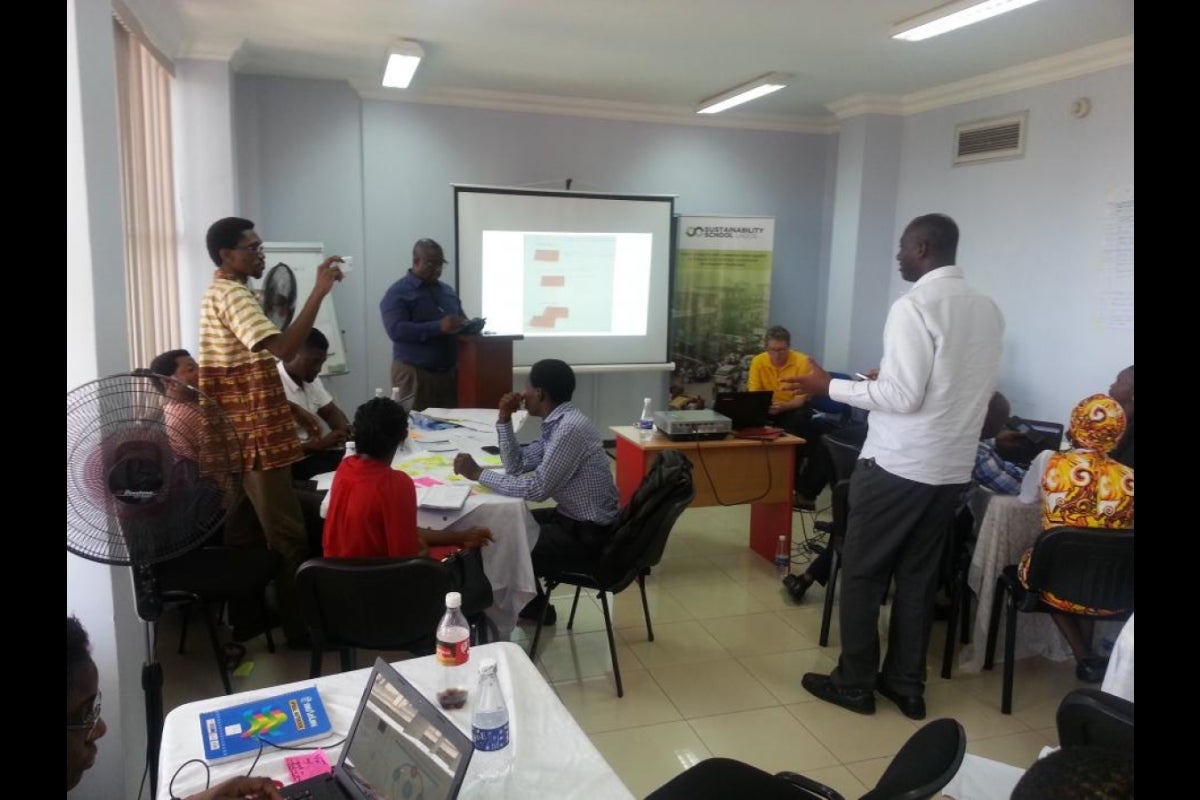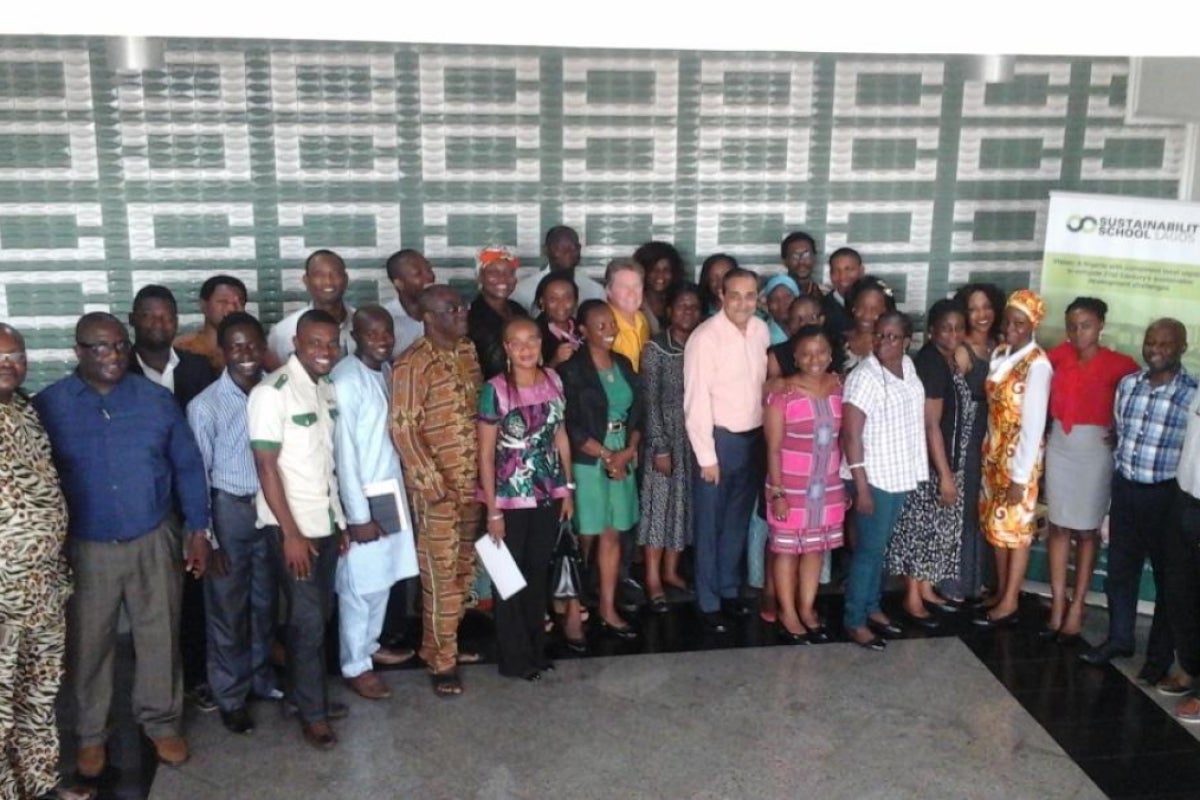ASU brings pioneering circular economy training to rapidly developing countries

Participants in the world's first Ethical Circular Economy workshop, held in Lagos, Nigeria, discuss their plans for local economic development through recycling and waste efforts. In a circular economy there is no such thing as waste; resources are remanufactured, refurbished and recycled to keep components and materials circulating in and contributing to the economy. Photo by Olufemi Olarewaju
Lagos, Nigeria, is an international megacity with an ever-growing population, dwindling resources and widespread environmental impact and has become the poster child for rapid urbanization in the developing world, despite being the center of the fastest-growing economy in Africa.
By 2050, the population of Lagos is predicted to double to nearly 36 million people, putting Nigeria on track to be the third-largest country in the world with a total population of 440 million, surpassing the U.S. and Russia. This unprecedented growth places an urgency among its residents, businesses and leaders to address its growing development and quality-of-life challenges.
In April, ASU’s Walton Sustainability Solutions Initiatives hosted a three-day Introduction to Ethical Circular Economy workshop — the first in the world — at Sustainability School Lagos, an institution modeled after the Arizona State University Julie Ann Wrigley Global Institute of Sustainability. The workshop was co-led by two senior sustainability scientists from the Walton Initiatives’ Global Sustainability Solutions Services, general manager Dan O’Neill and practice lead Rajesh Buch, with Olufemi Olarewaju (ASU Executive Master of Sustainability Leadership graduate), executive director and faculty member of Sustainability School Lagos.
“There is a tremendous amount of potential for a circular economy in rapidly developing countries,” said Buch. “It’s where the larger opportunity arises because it’s where most of the economic development is going to happen.”
A circular economy is an alternative to the traditional linear economy. In a circular economy there is no such thing as waste; resources are remanufactured, refurbished and recycled to keep components and materials circulating in and contributing to the economy. This concept has been gaining momentum in Europe and the U.S. but has yet to take hold in developing countries.
“The biggest problems facing a rapidly urbanizing developing economy like Nigeria are inherently social in nature and include inequality, youth unemployment, poor public education and health systems, poor sanitation, poor habitation, inadequate water supply and energy inequity,” said Olarewaju, one of the founders of Sustainability School Lagos. “Successful implementation of circular economy as a sustainable development paradigm for our part of the world must mean that it delivers solutions to these challenges.”
The workshop is a component of a broader course provided by ASU also called Introduction to Ethical Circular Economy. The 35 participants who attended the workshop in Lagos included Sustainability School Lagos students, city and state officials and members of the New Nigeria Foundation, a group of Nigerian stakeholders committed to promoting sustainable community development through public-private partnerships. Prior to the workshop, participants reviewed four modules of content, requiring 20 hours of online work to prepare for the solutions-based learning approach of the workshop.
Participants left the workshop with a certificate, a vision for a circular economy in Lagos and ideas for solutions that will be documented in a future published report. During the Lagos Central Business District's planning summit later this month, the group will be discussing the redevelopment of Lagos' Central Business District using circular economy and ASU's recent impact on Downtown Phoenix as models.
”The relevance of a program like this is in being able to apply its principles to address societal challenges,” said Patience Ogwara, workshop participant and programmes manager at New Nigeria Foundation. “The opportunity to do this, using the Lagos context, was personally and professionally enriching.”
Development and delivery of the course was funded by a grant from the Ray C. Anderson Foundation. Earlier this year, ASU became a Pioneer University of the Ellen MacArthur Foundation’s prestigious international Circular Economy 100 (CE100) network. The CE100 is composed of premier institutions from across Europe and the U.S. tasked with researching and developing innovations and solutions that encourage a more circular economy.
“Our hope is to deliver this learning experience to as many people as possible throughout the fast-developing world of Africa, Latin America and Asia,” Buch said.
As part of the grant, the next circular economy workshop will take place in June in Phoenix.
More Environment and sustainability

ASU fire expert Stephen Pyne on learning to live alongside fire
Stephen Pyne is having a busy retirement. On top of caring for chickens, sheep and citrus on his urban farm in Queen Creek,…

New interdisciplinary research highlights wildfire impacts on water and ecosystems in arid regions
As wildfires increasingly threaten arid regions, a new conceptual framework developed by a team of researchers offers a fresh…

Stanton urges bipartisan, national action on Colorado River water
Time is running out to determine the future of the depleted Colorado River, and any further delays in negotiating a deal could be…

